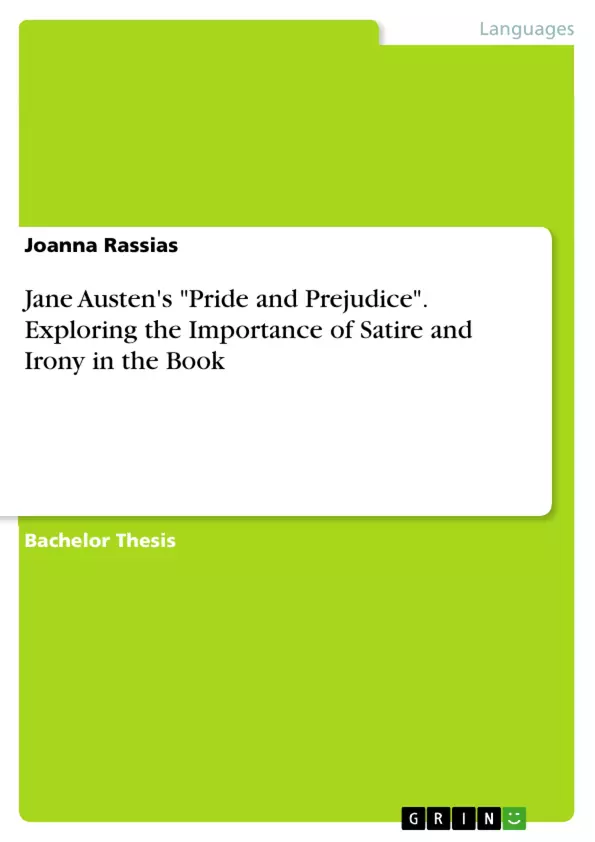Satire is a literary device, praised for its "use of humor, irony, exaggeration, or ridicule to expose and criticize people’s stupidity or vices, particularly in the context of contemporary politics and other topical issues," ("satire"). Pride and Prejudice is thought to be the most comical of her novels. Humor can be found just about everywhere, between the character descriptions, the imagery, and even the expressions of the characters, themselves! Satire and humor was an effective way for Austen to express her opinion on what was going on around her at the time without having to attach her name directly to these unpopular opinions on topics like love, marriage, and scandal.
In what is quite possibly her most whimsical, respected, and admired work, originally titled, First Impressions, Jane Austen’s Pride and Prejudice entices its readers to envision themselves as the protagonist in the ultimate tale of "enemies to lovers". Crafting each of her characters to perfection at the age of just 20, Austen has seemingly illustrated the ideal model of what marriage was like in Regency England, with quite possibly one of the most prominent and renowned opening sentences of any novel, "It’s a truth universally acknowledged, that a single man in possession of a good fortune, must be in want of a wife," (Austen 1). What is often overlooked is that imbedded in one of the most acclaimed and studied opening line reveals the omniscient narrator’s satirical approach to marriage in Regency England.
Table of Contents
- Introduction
- Satirizing Love
- Satirizing Class
- Satirizing a Woman's Role in Society
- Satirizing the Conduct Manual
- Satirizing the Manners of a Proper Woman
- Satirizing Property Ownership and Dower Rights
- Satirizing the Importance of Reputation
- Conclusion
Objectives and Key Themes
This paper explores the satirical elements in Jane Austen’s Pride and Prejudice, particularly the author’s use of irony to critique societal norms in Regency England. By analyzing key characters and their interactions, the paper aims to highlight Austen’s commentary on love, marriage, class, gender roles, and societal expectations.
- The role of satire and irony in Pride and Prejudice
- Austen's commentary on love, marriage, and societal expectations
- The portrayal of female characters and their agency
- The satire of class and social hierarchies
- The importance of reputation and societal pressure
Chapter Summaries
- Introduction: This chapter introduces the paper's subject: the importance of satire and irony in Pride and Prejudice. It explores Austen's use of humor and critique, highlighting the novel's witty commentary on societal norms.
- Satirizing Love: This chapter delves into Austen's satirical portrayal of love through the character of Mrs. Bennet. It examines how Mrs. Bennet's obsession with finding suitable husbands for her daughters reflects the societal pressures and expectations placed upon women during the Regency period.
- Satirizing Class: This chapter analyzes Austen's use of satire to critique the social hierarchy and class distinctions prevalent in Regency England. It explores how the characters interact and navigate their respective social positions.
- Satirizing a Woman's Role in Society: This chapter examines Austen's commentary on the limited opportunities available to women in Regency England. It explores how the characters are constrained by societal expectations and gender roles.
- Satirizing the Conduct Manual: This chapter delves into Austen's critique of the strict codes of conduct that governed behavior in Regency society. It explores how the characters are expected to conform to these norms and the consequences of deviating from them.
- Satirizing the Manners of a Proper Woman: This chapter analyzes Austen's satirical portrayal of the societal expectations placed upon women in terms of their behavior, appearance, and social interactions. It explores how the characters navigate these expectations and the consequences of failing to conform.
- Satirizing Property Ownership and Dower Rights: This chapter examines Austen's commentary on the economic realities of marriage in Regency England. It explores how property ownership and dower rights influenced societal expectations and the power dynamics between men and women.
- Satirizing the Importance of Reputation: This chapter analyzes Austen's exploration of the power of reputation and societal pressure in shaping individual lives and relationships. It explores how the characters are affected by the opinions of others and the consequences of damaging their reputations.
Keywords
Key terms and concepts explored in this paper include satire, irony, Jane Austen, Pride and Prejudice, Regency England, love, marriage, class, gender roles, societal expectations, female agency, reputation, and social pressure.
- Quote paper
- Joanna Rassias (Author), 2022, Jane Austen's "Pride and Prejudice". Exploring the Importance of Satire and Irony in the Book, Munich, GRIN Verlag, https://www.grin.com/document/1262854




